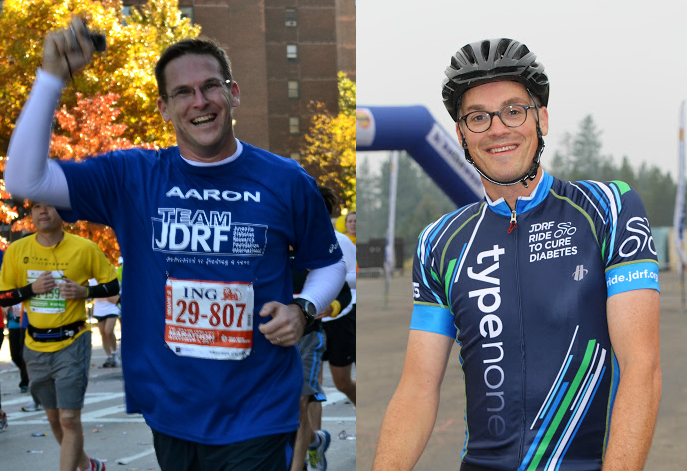Kowalski Brothers Talk Life with T1D


JDRF Chief Mission Officer Aaron Kowalski and his brother Steve both have type 1 diabetes (T1D). Steve was diagnosed at age 3 and Aaron, two-and-a-half years older, was diagnosed at age 13. Aaron sat down recently to ask his brother about their shared T1D experience. Read an excerpt below.
AK: Aaron Kowalski / SK: Steve Kowalski
AK: What do you remember about when I was diagnosed with T1D?
SK: I think Mom probably diagnosed you. I was waiting for Mom to pick me up from the YMCA where I was with some friends. I was annoyed she hadn’t come to pick me up yet – and this was in the time of payphones – so I borrowed a quarter from someone and called home and said “what’s going on? Why didn’t you pick me up?” And she said, “Aaron has diabetes.” And my response was, “you’re kidding,” and she said, “would I kid about that?” I’ll never forget the day we found out you were type 1.
AK: You were little [when you were diagnosed]. I remember our parents – you were falling and not acting right, and they couldn’t figure out what was going on. I remember we would have to drive a long way to take you to the doctor. Back then it was just crazy, it was like the craziest diagnosis. It was out of nowhere.
AK: How do you think sharing the T1D experience has shaped our relationship?
SK: As a little kid I had it in my mind that I shouldn’t let my blood sugar be high and I always tended to be on the low side. I’m hypoglycemic unaware, so I don’t know when my blood sugar is low, and that was always a problem for me. It wasn’t until a year and a half ago that you gave me a tip that drastically changed my control of my diabetes. After playing a round of golf and having a severe hypoglycemic reaction, you told me I was bolusing like a teenager and I didn’t even know there was such a thing. That teenagers needed more insulin. But after having 30 to 40 years of problems with low blood sugar, they disappeared based on the tip you gave me. So in terms of how T1D shapes our relationship, I wouldn’t say it has shaped it much. But it has shaped, at least for me, the way I control my diabetes.
AK: Who would you say has been your greatest supporter, either now or in childhood?
SK: Both of our parents in their own way. I think mom was more hands off but showed us that she didn’t want diabetes to be an albatross. It was something that was there and we dealt with it but she was more laid back in her handling. I worked throughout high school in the evenings and on weekends and one night I had a severe low blood sugar episode. Mom came into my work and shoved a glucagon shot in my butt and then just said “he’ll be fine in 10 minutes”. Some might look at that as someone who doesn’t care but I think it’s the opposite. She sort of played down the disease as something we dealt with and then encouraged us to live to the fullest.
AK: We were really fortunate. I always say that our parents always encouraged us to do anything anybody else did, whether it was be good at school, play sports, you played basketball, I played golf, go to France as teenagers in the 80’s. So I think we leaned on each other: growing up in the same bedroom together and dealing with it together. And then our parents were very helpful.
AK: What have you learned from living with T1D?
SK: It’s hard to say. I’m much more serious and reserved than you are and part of me wonders if that’s related to being diagnosed as a three-year-old. Probably not, but it makes you wonder. I think being a little kid with T1D maybe did force me to grow up faster and maybe I’m not as carefree as I would’ve been if I hadn’t been diagnosed with type 1. I think it taught me some responsibility or at least I tried to be responsible in taking care of myself at a younger age. The converse of that is it gave me confidence. Even though I wasn’t great at controlling my blood sugar, I do think that attitude that we can do anything anybody else could and diabetes wasn’t going to hold me back played a part in being confident and making decisions that sort of control my own destiny. So I do think there’s a plus side to having diabetes. I run my own business and people ask me “were you scared to start it?” I love it. I was confident I could do it and a little bit of that does tie back to living as a diabetic and taking control of who you are and what you’re gonna do.
AK: Is there anything that you’ve never told me but you want to tell me now?
SK: That’s a tough one. I don’t really think there is anything. Although, I don’t know if I ever said thank you for that tip on the golf course.